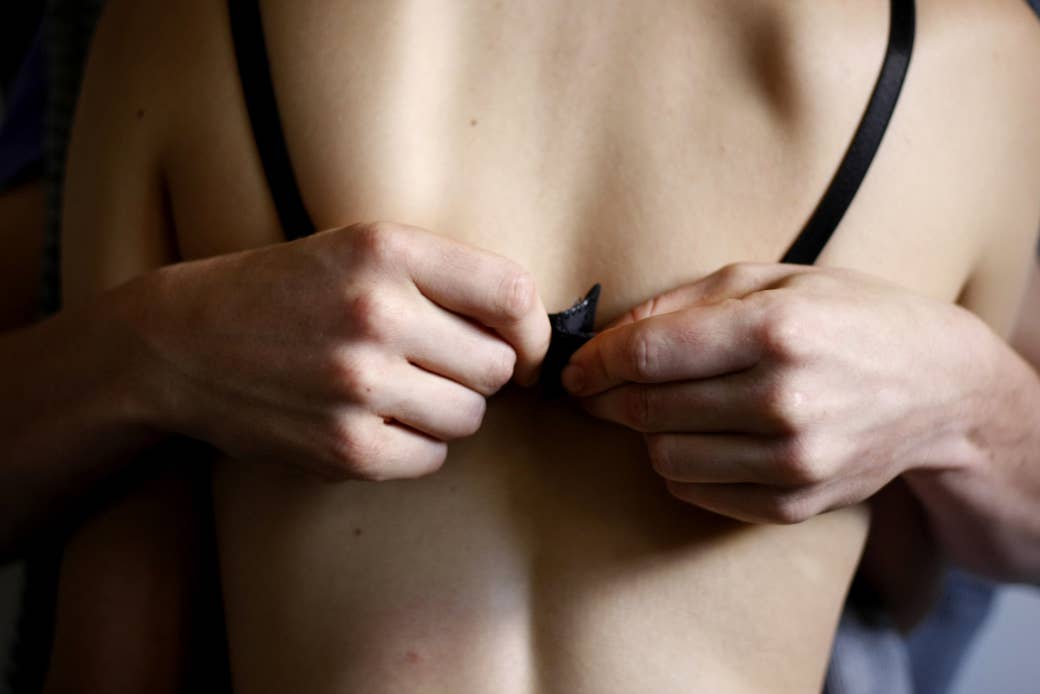
Back in June, we asked readers to fill out a 10-question survey about sex and consent in the age of #MeToo, and boy, did you guys respond — 34,969 of you in fact. And while this is certainly not a scientific survey (shoutout to one participant whose gender is “Big Dick Mystic Known to Hypnotize”), a lot of you had revealing, thoughtful, and occasionally heartbreaking things to say about sexual assault, harassment, and consent.
Below are some of your responses. They have been lightly edited for clarity.
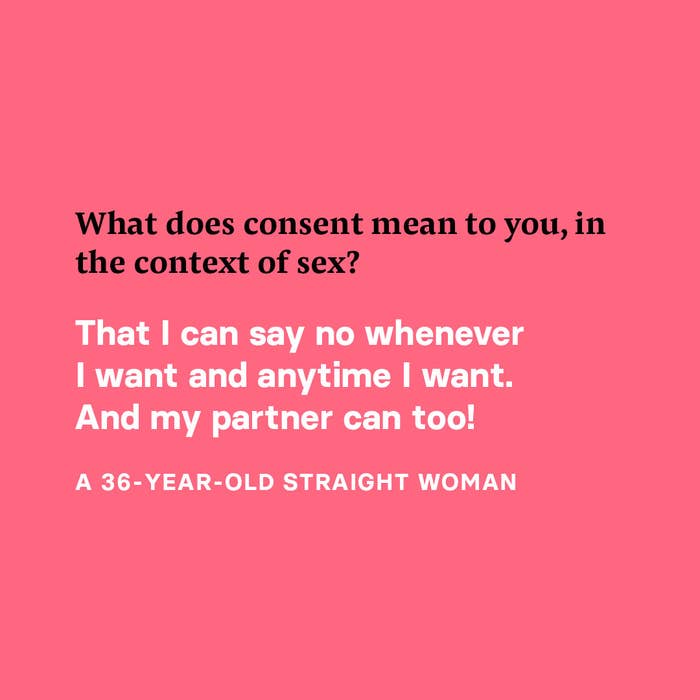
What does consent mean to you, in the context of sex?
30, bisexual, female
“With a new partner, or any partner I’m not in an established relationship with: the word yes. I must say it, I must hear it. With an existing relationship: enthusiastic, emphatic participation and verbal affirmations renewed throughout the act.”
33, pansexual, nonbinary
“I'm still figuring this out, tbh. Although I'm familiar with enthusiastic consent as a concept, my upbringing really glorified ‘being taken’ as the ultimate turn on. So consent isn't innately sexy to me yet. I'm abstaining until I figure this out.”
29, straight, male
“The ‘yes’ must be mutual, the ‘no’ can be individual. Each person has the right to say no and draw a boundary at any time. If one person says they don’t want to have sex or don’t want to do a particular thing, then the partner has a responsibility to respect that and wait until the other is ready and willing. If someone changes their mind about sex in the middle, then they have the right to stop. Of course, this will be emotionally and physically frustrating at times, but intimacy is not only about fulfilling desires, but about caring for the needs and boundaries of others. Sex is ultimately an act of intimacy. If someone’s boundaries are crossed, that sabotages intimacy and breaks trust.”
40, bisexual, male
“Affirmative, competent, and clear communication that you want to engage in the activity. It means open communication at all stages.”
33, straight, male
“I would say consent is implied unless either party states otherwise.”
15, straight, female
“Both parties [involved] with it are okay with it. It has to be a ‘Yes, I’m willing...’ not an ‘I don’t know...’ or a ‘No.’ If someone’s unsure about it, just don’t do it altogether, and you shouldn’t force what you want upon them. Even if they agree to one thing, that doesn’t mean they agreed to everything else. Having agreed to one thing (e.g., kissing) does not permit you to assume they’ll be okay with other things (e.g., oral).”
28, gay, male
“Making sure my partner and I are open and honest about what we want and what we don’t want. Having a relationship where we are both comfortable communicating our needs to each other. Back when I was hooking up with guys I met online, consent was being able to set boundaries and stick to them. Being assertive about boundaries and respecting the other person’s boundaries. Making sure we are both on the same page about what we’re looking for before we meet up.”
30, straight, male
“I believe the only really safe consent is through lifelong commitment in marriage.”
36, straight, female
“I grew up being pressured to ‘try to have sex’ and felt like once I took a guy ‘so far’ I was obligated to ‘finish.’ Just not ever feeling that ever again is consent. That I can say no whenever I want and anytime I want. And my partner can too!”
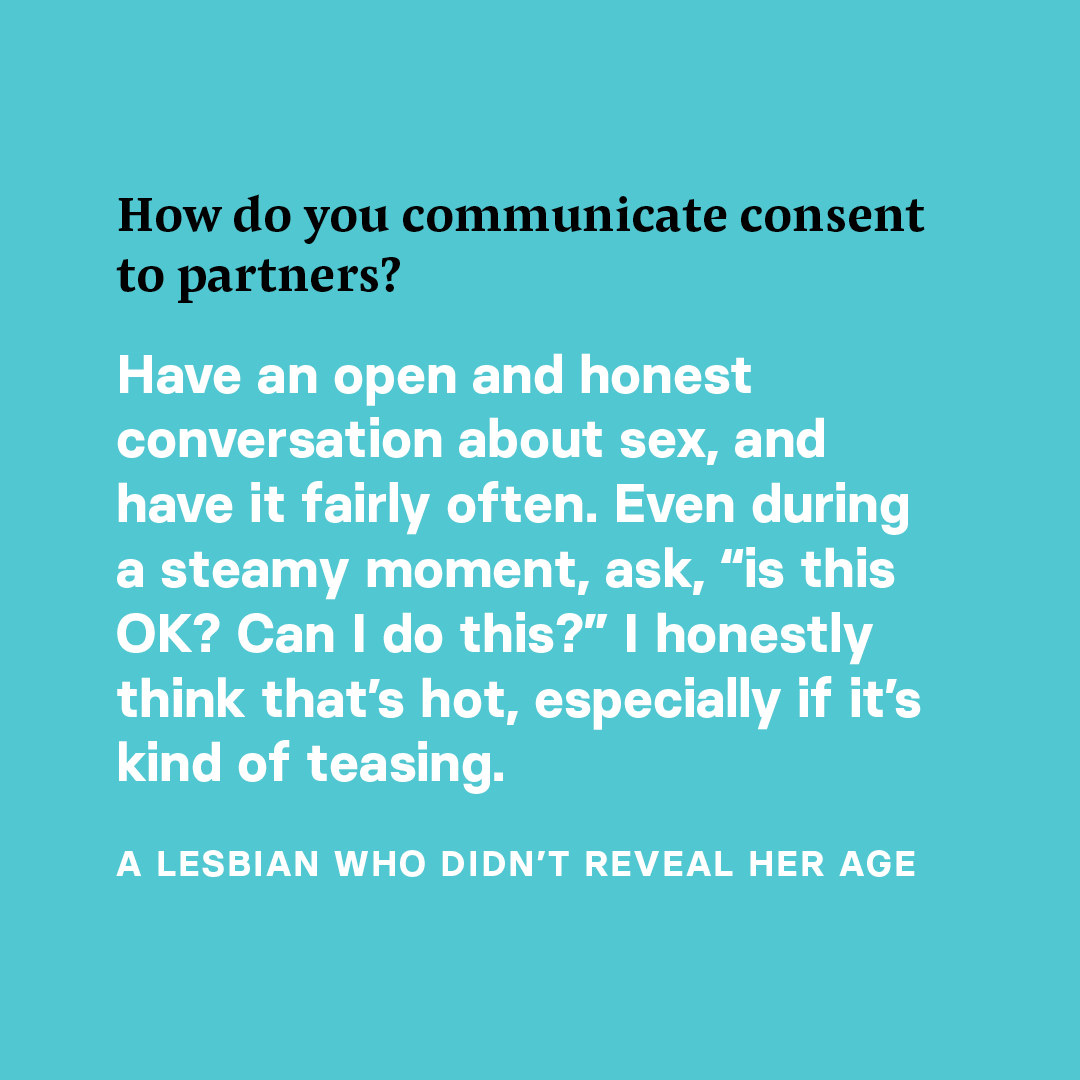
How do you communicate consent to partners?
25, gay, male
“I always have a conversation before anything happens. TALK IT THROUGH, PEOPLE!! If you are out at a bar and someone asks to go home with you or you ask to go home with someone, talk to a friend beforehand. Use your community to help ensure that you are being safe and smart. Set boundaries and if things start going the wrong way, call, text, send some kind of message for help. For women or members of the LGBT community, saying no can be dangerous, so look for alternative ways to get help before it can get to that point. In the age of digital hookup apps, create a network for yourself [of people] who will come to your aid and know where you are at any time.”
35+, straight, female
“I’m pretty straightforward and direct, especially if I don’t like something, but that’s a skill I’ve learned over the years. I had to unlearn ‘being nice’ all of the time because for me it meant not having clear, straightforward boundaries. I also had to retrain myself to not assume that my partner (or anyone else, including myself) could read minds and ‘just know’ what is comfortable or welcome. Also, as someone who has had to deal with PTSD from sexual assault, as well as severe endometriosis that caused pain during sex, I had to learn how to advocate for myself sexually — which meant being honest about when I hurt or was having an anxiety attack. I had to learn how to communicate with my partner that I felt broken as a woman because I couldn’t have intercourse ‘like normal women.’ And I had to learn how to use loving words and thoughts both in my own head and to my partner.”
32, straight, male
“Well, I've been with my partner for almost 10 years, so it’s kind of weird to say we ‘communicate consent.’ If one of us is not in the mood, and the other person initiates, we just say we’re not in the mood. Before that, as a guy, I honestly can’t say that I ever thought about communicating my consent. I think in the time and place I grew up, girls generally assumed that when a guy showed romantic interest in any way he was implicitly consenting to sex, which in my case was always true.”
Lesbian, didn’t reveal age
“Have an open and honest conversation about sex, and have it fairly often. Discuss needs, wants, likes, dislikes, and things that are off limits. Agree that changing your mind is acceptable and that deciding to stop, even mid-sex, is ok. Even during a steamy moment, ask, ‘Is this ok?’ ‘Can I do this?’ I honestly think that’s hot, especially if it’s kind of teasing. And if your partner says ‘no, I don't like that,’ there's always something else they might. You just have to ask and talk about it.”
47, straight, male
“As a straight man I'm usually in the role of initiator — trying to get consent, not give it. It feels awkward to ask directly. I try to read body language — I’m not going to even kiss her if I don’t get some kind of positive vibe. From there I’m usually pushing a little further, step by step, seeing how she reacts, backing off a bit if she seems uncomfortable. I look for a more definite ‘yes’ before I enter her — I’ll usually hold up a condom and say ‘shall we?’ or say something like ‘I want to be inside you,’ and wait for the ‘yes please’ or a smile and nod or something like that.”
28, gay, male
“If my partner is making sexual advances toward me, I consent by clearly reciprocating those advances with my body language and touch. If I am the one making the sexual advances, I make sure to evaluate my partner’s body language. If I notice some form of hesitation, I ask if he’s okay with having sex, so there is no ambiguity towards how we’re feeling.”
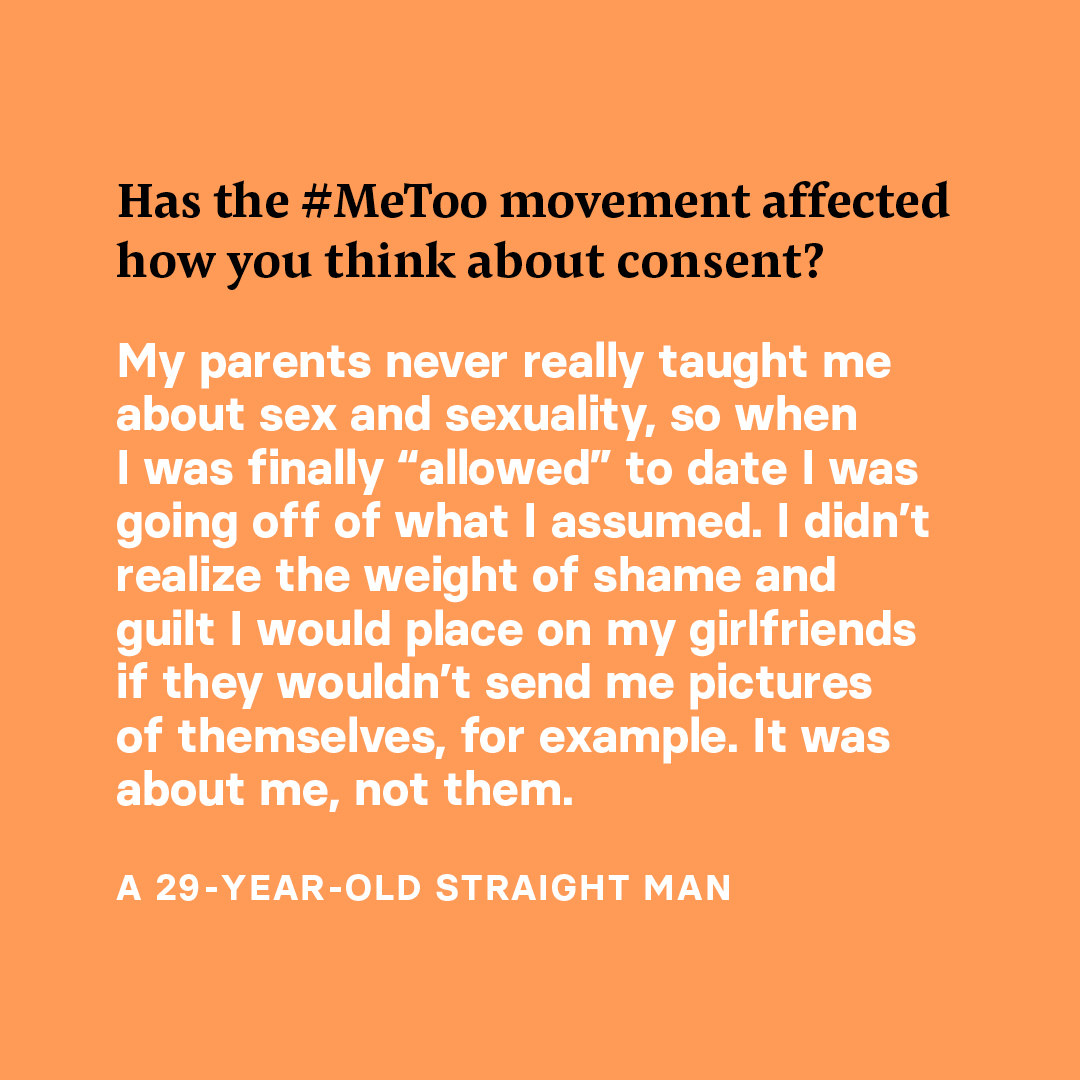
Has the #MeToo movement affected how you think about consent?
29, straight, male
“Yes, I have contributed to the unhealthy reality of male dominance and expectation in high school. My parents never really taught me about sex and sexuality, so when I was finally ‘allowed’ to date I was going off of what I assumed. I didn’t realize the weight of shame and guilt I would place on my girlfriends if they wouldn’t send me pictures of themselves, for example. It was about me, not them. My sexuality and their sexuality was about me, not a mutual respect. The #MeToo movement had showed me that it’s not just about our (men’s) actions, but our words, intentions, assumptions that can cause real, life-changing harm.”
35+, straight, female
“I think a lot of people think the #MeToo movement has been strictly about women finally speaking up, but that’s not true. Men have to contend with boundary issues also. I will never forget a couple years ago, my 8- or 9-year-old daughter and I were walking with her swim teammate behind their young, handsome, friendly coach, and my daughter’s teammate reached out and pinched the butt of her grown man coach! He whipped around in shock — as I would have too — but he didn’t know what to do or say. I realized that if this had been a female coach with a male swimmer there would have been a little more dialogue about how that’s not appropriate coming from the coach. I stepped in on his behalf and explained to this bold young girl that her actions weren’t appropriate and that she needed to respect his body just as she would want someone to respect hers. She rolled her eyes and apologized. It was a real eye-opener.
“I’ve also realized how many times I welcomed sexual acts that had been performed on me [because] I was told, ‘that’s just how boys/men act.’ I had become desensitized to it so much so that it was like coming out of a coma.”
33, demisexual heteromantic, female
“It has made me realize that conversations about consent need to start early and start often with our children.
“I was babysitting my friend’s 5-year-old son. It was time for bed and he needed to put on clean underwear and PJs. He still needs a little help sometimes, so I was in the room. However, before he would begin, he told me his privates were for Mommy and Daddy only and could I close my eyes (appropriate for a child who still needs assistance bathing sometimes). I was amazed and so grateful that he is being taught about consent and feels he has the agency to request what he needs.
“Of course, I closed my eyes and covered them with my hand so that he had no doubt that I was abiding by what he had consented to. When he needed help with a button, I asked permission to open my eyes to help and then closed them again immediately.
“When this might have happened before the #MeToo movement, I probably would not have been aware of the ramifications for him and for all the people he will meet and have relationships with in the future.
“Education about consent starts at home and the #MeToo movement helped open my eyes to how explicit education and conversation about consent is necessary, even from a young age.”
55, gay, male
“Of course. It has made me more self-aware and less forward or brazen in my approach.”
16, trans male, nonbinary
“As a masculine-presenting person, I am more aware that people may be intimidated by me so I am more careful about interacting with people.”
46, straight, female
“Yes. I had forgotten (?) that men get to consent too. As a straight woman, when I initiate, I am never refused, but is that because he consents, or because he thinks it is an expected part of being a straight man? It changed my perspective.”
32, straight, female
“Yes! In such a powerful way! In my twenties I felt so invested in pleasing men and didn’t ever consider advocating for what I want. Now I feel so happy to share what I like and learn what my partner likes too. It makes the sex so much more enjoyable!”
34, straight, male
“Yes! Between parents who didn’t really talk about sex and lackluster sex ed in a small town, I had never fully considered what consent could really mean. A few years back I found myself in a situation where, based on previous conversations, I decided I'd try forcing myself on an on-again, off-again girlfriend who had said she enjoyed being dominated. In the midst of it all I realized that in my mind I felt like I could be raping her because she had never truly consented. As it all worked out, she was into it, but it forced me to reconsider the concept of consent. The #MeToo movement has allowed for us to have a stronger, more open dialogue about consent. It has also made me realize that as my son (who is now 5 weeks old lol) gets older, it will be imperative that as his father I am very strong with him on sex ed and consent.”
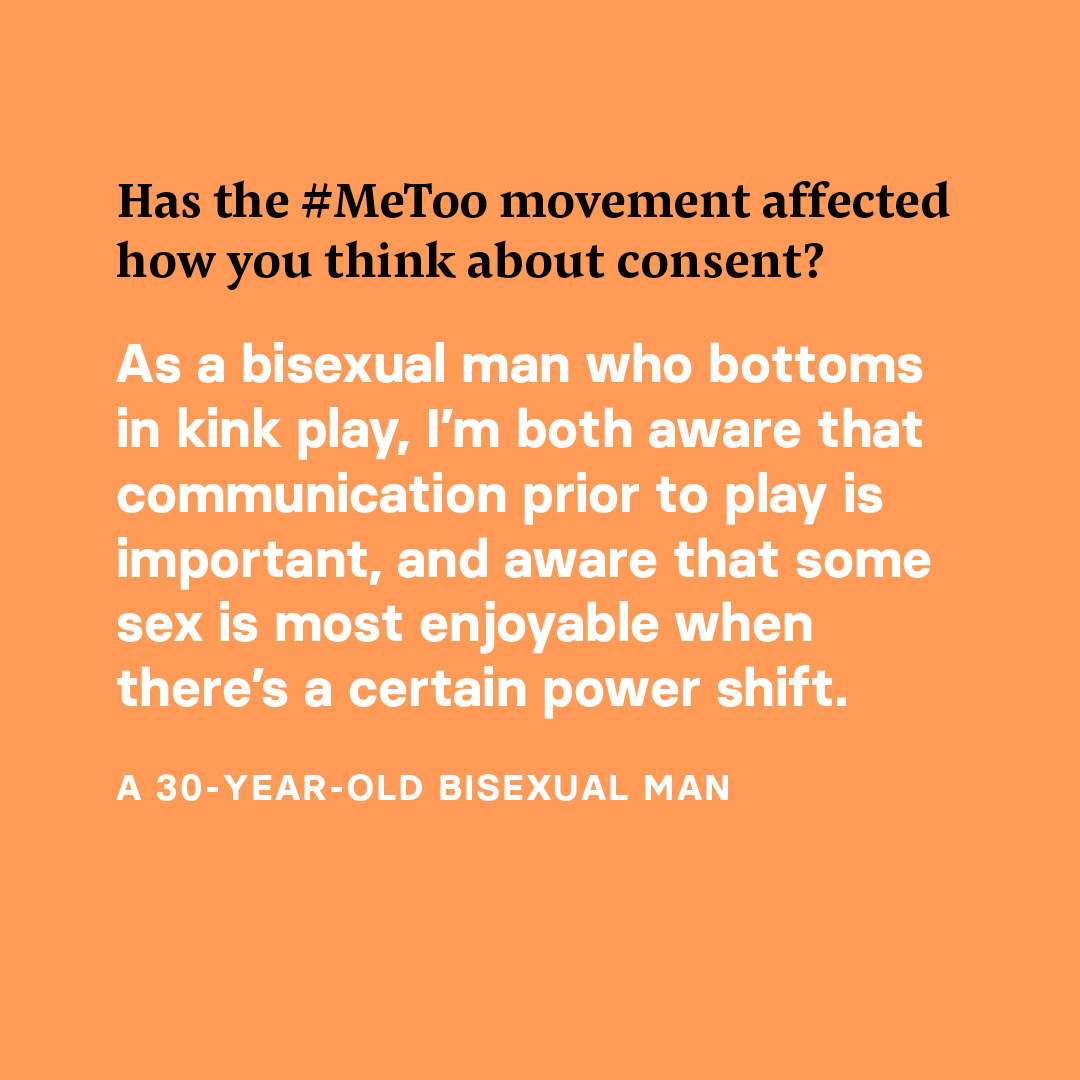
31, straight, female
“Yes. I realized that from a legal standpoint I have been raped, simply because a man proceeded to have sex with me without a condom even after I asked him repeatedly to stop. However, it was not violent, I never fought back, made a scene, or got up and left. It felt easier to just let him finish. At the time, I never thought about this as rape.”
30, straight, male
“Yes, when my wife says ‘no’ when I try to engage in sexual activities, I stop. Later, she will be upset that I stopped and not understand why. She says I should know the difference between a playful ‘no, stop’ and a hard ‘NO, STOP.’”
41, bisexual, female
“I think, if anything, it’s improved my ability to speak with comfort and authority about the topic. It’s possible that my expectations and definitions of acceptable behavior have been pushed also — any coercion or pressure in a sexual encounter is unacceptable and a violation of mutual consent, for example, and I’m not sure I could have been so clear about that boundary pre-#MeToo.”
40, straight, male
“Yes. I think about my teenage years and trying to slide my hand up a girl’s shirt while making out. I should have asked first. Sometimes they let me. Sometimes they stopped me... But I should have asked.”
30, bisexual, male
“Yes. But I’m pretty torn about it. As a bisexual man who bottoms in kink play, I'm both aware that communication prior to play is important, and aware that some sex is most enjoyable when there’s a certain power shift. Though I sometimes play with men who are bigger or more intimidating than me (and in situations where I may be emotionally or physically inhibited), I generally consider it to be my responsibility to say when I want to stop (unless a hard limit was discussed in advance). I think the movement has been extraordinarily valuable in making men aware of the consequences of their actions when they breach consent, and clarifying what a consent breach is. But I also think it’s perhaps served to devalue consent breaches and miscommunications to seem (in a social sense) to be on the same level of morality — meaning culturally we seem to be treating rape, misconduct, and miscommunication as effectively the same thing. They aren’t. And they shouldn’t be treated or punished the same.”
32, straight, male
“It has helped me consider how dangerous it can be to let awkwardness prevent people from having necessary discussions. It has also helped illuminate the sense of entitlement to sexual gratification many other straight males have.”
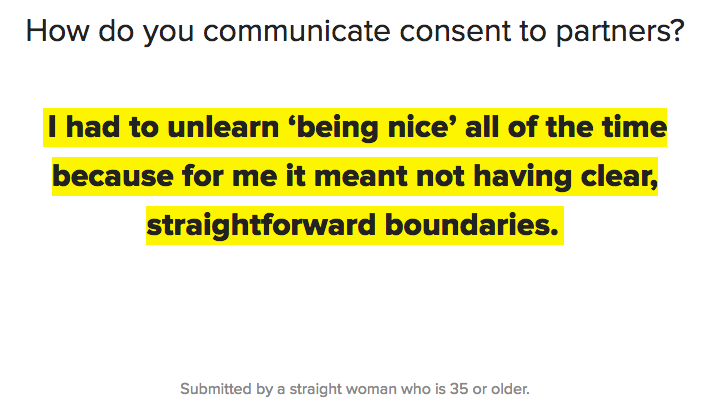
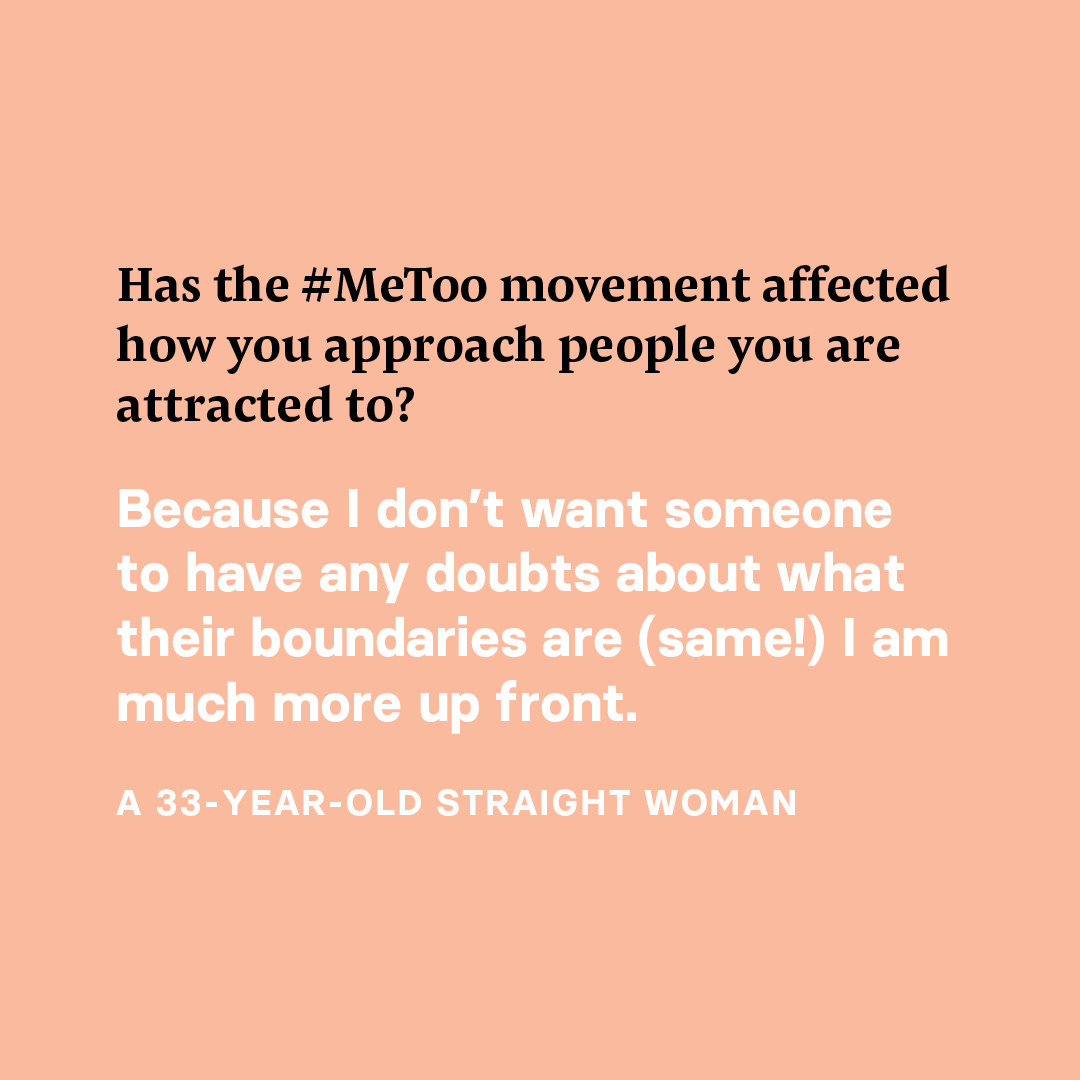
Has the #MeToo movement changed the way you approach people you are attracted to?
30s, straight, male
“Yes. Before, I would simply let the moment take over and proceed as long I was receiving physical [cues]. Now though, I will ask specifically if we want the same thing and want to move forward.”
Lesbian, didn’t reveal age
“Yes and no. Being a lesbian is a lot of talking about each other’s feelings anyway but I like that. I like talking about that because it’s important. I think #MeToo has made me decide that if someone can’t have a conversation about sex with me beforehand that I probably don’t want to have sex with them. But I definitely think about respecting people more when it comes to consent. I think I’m already good at it because I understand consent, but now I’m even more aware and thoughtful.”
22, straight, male
“Yes. I feel that I have been sexist in some ways when I approach women. I don’t know how to approach them anymore. I honestly feel that no matter how I approach women it will invoke microaggressions. I feel very conflicted and upset whenever I see an attractive woman, often wondering if my even noticing her in such a way makes her uncomfortable.”
60s, lesbian, celibate
“No. After multiple abusive relationships (with men and women) I decided I was better off to not have a sexual partner or be in a close intimate relationship. (It’s been a very positive decision.)”
24, straight, male
“No. I believe that in this day and age, we are all well aware when we are initiating physical/ sexual interactions with someone who is not interested. If there is a need for intoxication, sedation, or coercion by either party, the consent was never there. We will never find a justifiable moment of nonconsent when you require verbal communication and agreement with both parties.”
55, gay, male
“Asking before touching/groping — even in a dark, cruisy bar ;-)”
33, asexual, female
“When I was (a lot) younger, I could get kind of ‘butthurt’ if someone rejected me. I know now that not wanting to go out with someone, saying no, is a perfectly fine response.”
33, straight, male
“Most definitely. It may seem awkward, but asking before every interaction is imperative.”
40, gay, male
“It has. I attempt to be more thoughtful when flirting online. It’s too easy to cast a wide net with a naughty photo hoping for a response when the audience may not have a remote interest in participating in that form of ‘flirtation.’”
32, bisexual, female
“No, I’m in a committed relationship (married for 14 years) and we are both on the same page about our personal space, what things are okay and not okay, and where our boundaries lie. It would be a bit more daunting in this environment, though, to know what is considered flirting and harassment. From a straight woman’s perspective, we don’t really have a clear idea of what kind of things would be too much for other men. From a bisexual perspective, it’s hard to know as a woman to a woman what advances are appropriate as well.”
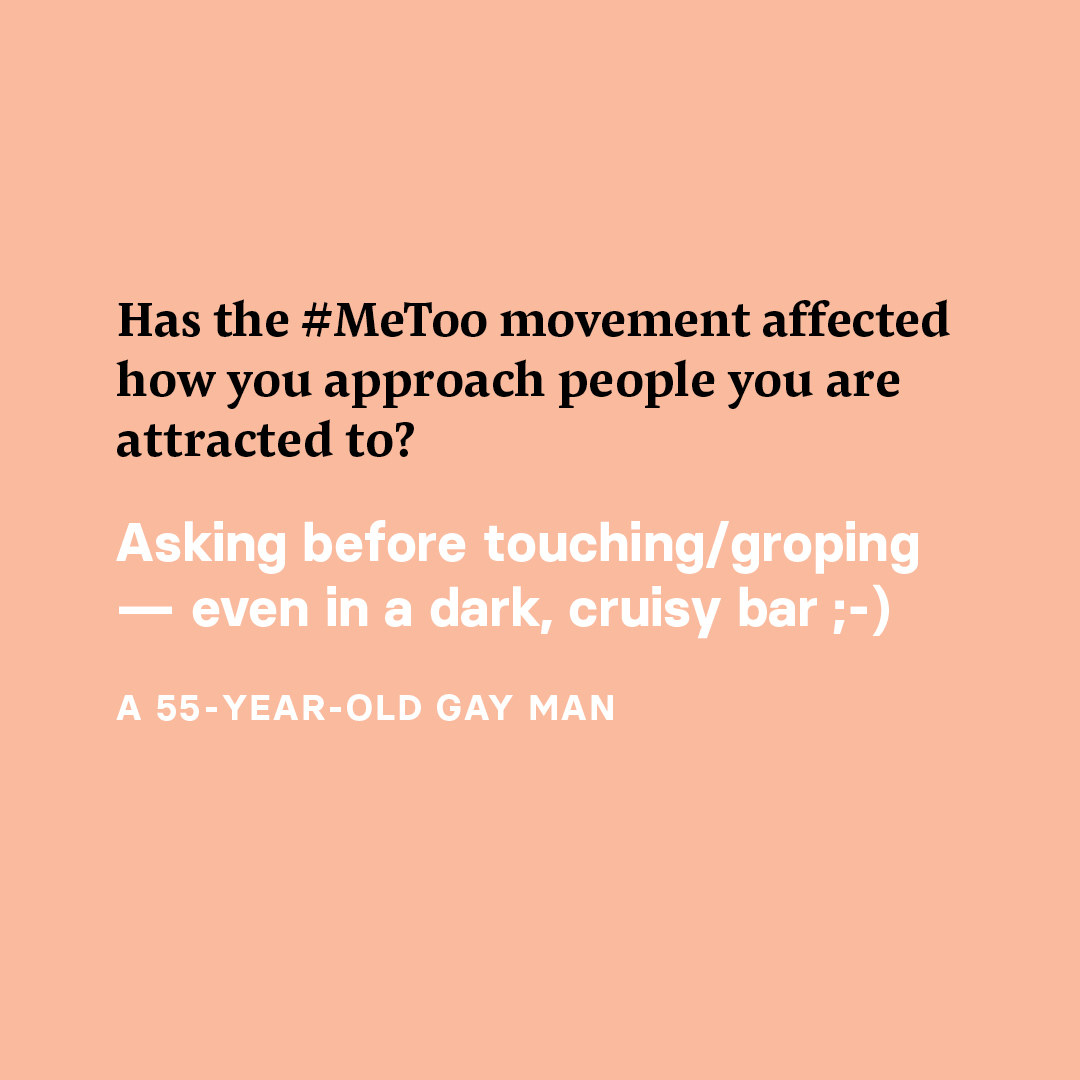
23, bisexual, nonbinary
“No, I already learned a lot (and, frankly, crossed some lines) earlier in relationships while figuring out my queerness. I feel like when the #MeToo movement began, I had already figured a lot of this out — as anybody who has reached adulthood/their early twenties should have.”
22, straight, male
“It has led me to question how I, as a straight man, can possibly approach a potential partner without being seen as a potential creep given the number of negative experiences women seem to have with men in general.”
40, straight, female
“People can’t flirt anymore without ‘consent’ which is bullshit. Men get in trouble for doing a natural thing that wasn’t a problem until people started getting their feelings hurt.”
23, asexual, female
“Sort of. I'm ace (yes, it’s a real thing, and yes, I’m queer and included in the LGBTQ+ community), so I don’t feel sexual attraction to anyone. But I do feel romantic attraction, and the #MeToo movement has made me more confident that I will be listened to if I’m not treated well, and more aware that I have a say in what happens to me. I’m more confident approaching people I’m romantically attracted to, and I feel like I have more power in deciding what I’m comfortable with sexually.”
33, straight, female
“I am terrible at flirting, and I’m terrible at reading signs that someone may be attracted to me. Because I don’t want someone to have any doubts about what their boundaries are (same!) I am much more up-front. I am much more cognizant about saying something such as “Nice tush!” because if I don't have 100% certainty that they would welcome the comment in a fun, flirty, playful manner, then I have just sexually harassed them.”
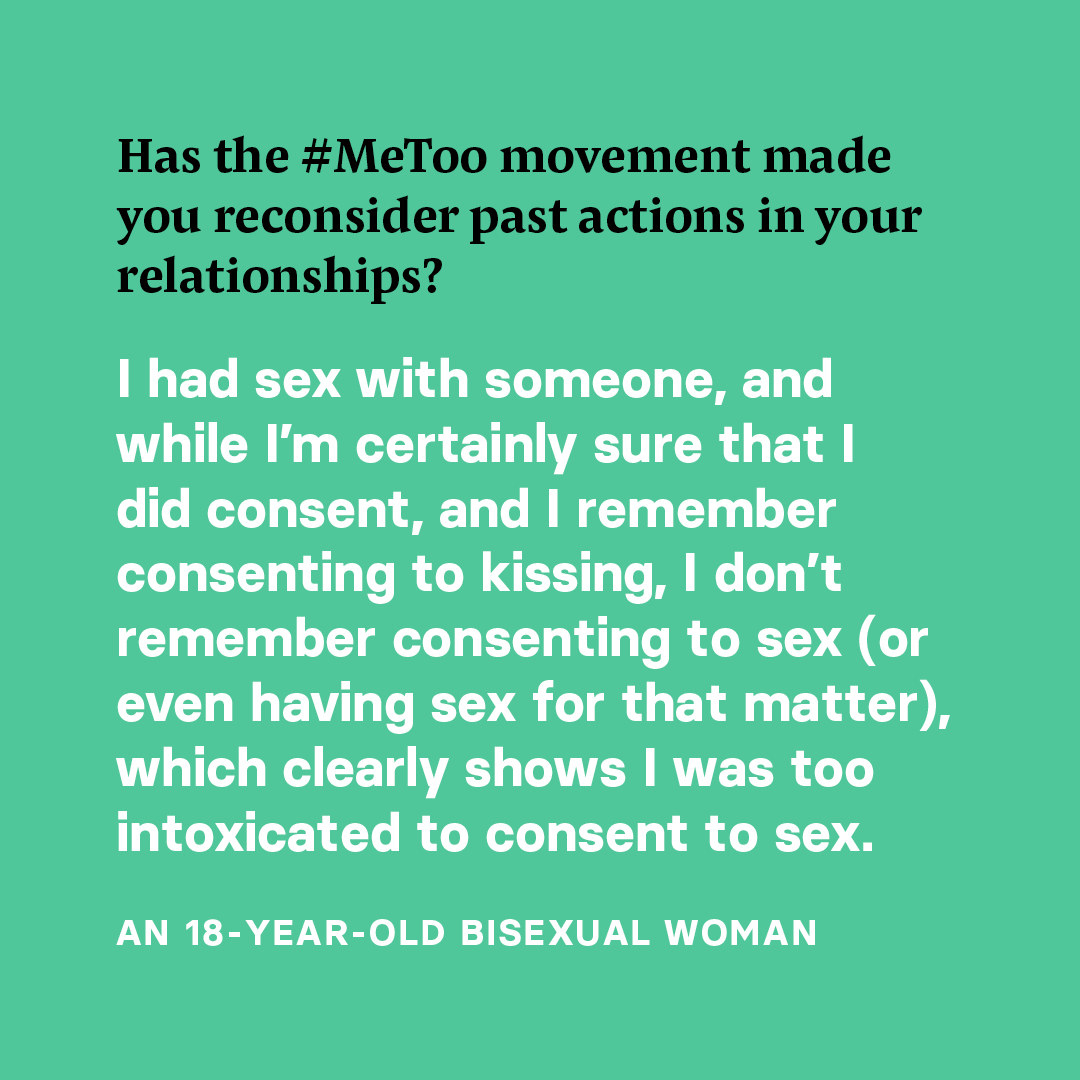
Has the #MeToo movement made you reconsider past actions in your relationships?
18, bisexual, female
“Not the actions of myself, but the actions of others. For instance, I had sex with someone, and while I’m certainly sure that I did consent, and I remember consenting to kissing, I don't remember consenting to sex (or even having sex for that matter), which clearly shows I was too intoxicated to consent to sex. I was 17 at the time (age of consent in the UK is 16) and he was 28; he should’ve taken it upon himself to recognize that I was unable to consent because I’d had too much to drink.”
24, straight, male
“I remember one time in particular that I wanted to have sex, my girlfriend did not, but she ‘gave in’ to make me happy. Her body language and tone of voice were obviously communicating that she did not want to have sex. I continued anyway. Immediately after I finished, she began to cry, and told me how awful it made her feel that I cared more about having sex than I did about her. I was horrified at the time, and my behavior changed (this was about four years ago). However, it wasn’t until the #MeToo movement that we discussed some of the institutional reasons for that behavior, and that I began to consider the way that we as men are taught, even implicitly, that having sex makes us powerful.
“I also began to explore the opposite side of that; namely, that rejection of a sexual advance made me feel weak, unwanted, and undesirable. I truly believed that if I asked in the right way, or if I was good enough, that my girlfriend would always want to have sex with me. I felt ashamed and weak when she would say no...I always took her ‘no’ to be a direct reflection of her feelings towards me. #MeToo helped me to realize that her ‘no’ is not about me, but about her. Now, when my girlfriend does not want to have sex, I don’t take it as a personal attack. I know she loves me, is attracted to me, and also has different desires at different times. It seems ridiculous to me now that this was not obvious to me since the beginning of time. I think my lack of understanding really speaks to the prevalence of rape culture in shaping boys’ understanding of sex and to male privilege. Hello?!?! Not everything is about me?!?!”
35+, straight, female
“I’m divorced and my ex-husband was all about having his sexual needs met regardless of how I was feeling. He was unconcerned with my needs or feelings. And because we were married I believed that it was my duty/obligation to please him sexually ‘or else.’ Or else he’d cheat on me, or leave, or that I’d somehow be a bad wife. I realized that one of his favorite sexual fantasies — being awoken from sleep by having sexual acts performed on him — was something he was all too happy to act out on me. I didn’t like it at all for many reasons, not the least of which was I have severe insomnia, but now because of the #MeToo conversation, I realized that this is a form of rape! These realizations are helping shape the conversations about consent and relationships that I’m having with my teenage daughter. And it’s also making it easier to have those conversations because the door is already open.”
21, unsure, male
“Yeah, I’ve considered the times I’ve just woken up next to a girl I’d slept with the night before and started something first thing in the morning without checking that it was okay — it always has been, but it’s important to remember that what was okay yesterday might not be okay today or tomorrow. Always get consent.”
72, lesbian, female
“I wish the #MeToo movement was available in the 1950s. My life would have been more pleasant. I spent ALL my time frightened of the opposite sex due to the rough treatment I received. I married at 19 years old to escape contact with the world and be safe with one man. That was a huge mistake.”
24, bisexual, nonbinary
“Yes, especially when I’ve been on the ‘eager’ end of a relationship. I’ve rushed into sex a lot of times because I thought it was an expectation. Now I realize that my reaction to that perceived expectation has led me to pressure partners into intimacy because I thought it was just something that everyone does.”
53, straight, male
“Yes. I took my cues from movies and TV where it was common for men to refuse to take no for an answer (e.g., any James Bond movie or Hawkeye Pierce from M*A*S*H), and so it was considered acceptable to make suggestive comments or ask a girl out even after being told no.”
22, queer, nonbinary
“It has. I’ve looked back on one relationship in particular about five years ago in which there were definite nonverbal cues that my partner was unsure about continuing and I took a nervous yes as excited enthusiastic consent. The partner and I have since talked about it and they said it was a drunk night and boundaries weren’t violated, but I know from my own experience how heavy a shaky yes can be. I’m autistic and have a hard time with small nonverbal cues, but I’m always trying and working to be more cognizant and aware of what my partner’s body is trying to tell me.”
23, gay, nonbinary, male presenting
“Yes, because I feel that I took liberties before, such as sending nudes to others who I had previously sent consented nudes to without obtaining consent again, or switching positions/beginning new acts during sex without explicitly asking. Just because Billy wanted my nudes on Tuesday doesn’t mean I shouldn’t ask before sending them on Wednesday. Further, it has improved my sexual communication because I now ask more questions and get more feedback from partners.”
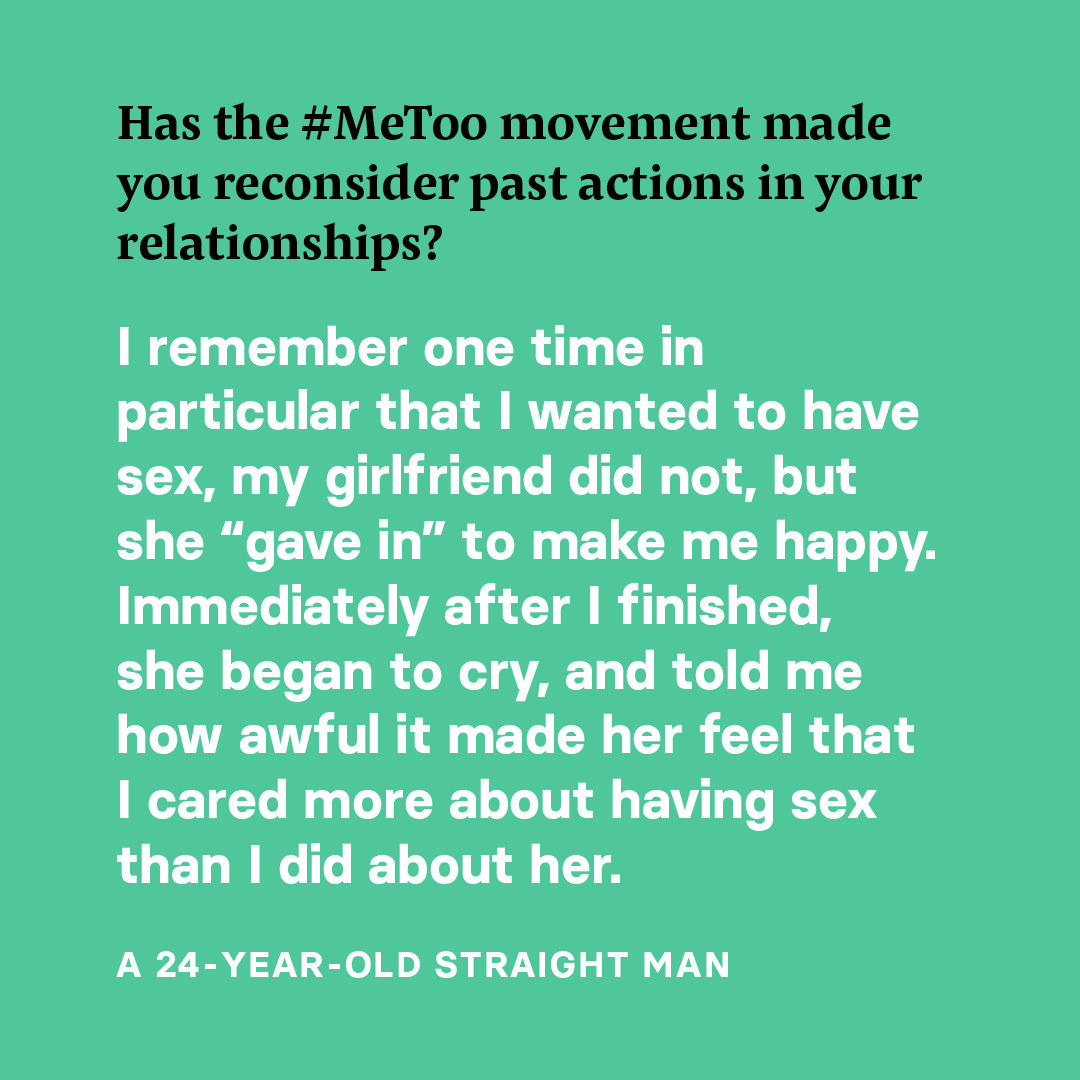
40, bisexual, female
“Yes. I was accused of sexual assault because I hadn’t explicitly asked if I could go down on my lover. Never mind that we had gotten into bed, we both took our clothes off, we made out, she put her hand in my pussy, she said ‘I love you,’ etc. I later spoke with a therapist about her accusations and the therapist said consent can be verbal or nonverbal and that she didn’t think I had assured my [lover].”
24, gay, male
“In the wake of #MeToo, I’ve read stories from people who believe that you cannot give consent when you are inebriated. This made me think about the times I got too drunk and woke up in a guy’s bed without any memory of having sex with him. This happened more than once, but I still don’t think I was raped and I gave consent for whatever happened to me on those nights.”
23, asexual, female
“Yeeep. I realized that I’d actually been sexually harassed by a professor, and that while I know they didn’t mean to hurt me, two of my partners in the past did not have my consent — and didn’t ever bother asking for it. They just assumed that since I wasn’t actively saying no (I was too shocked to realize it was an option at the time) that I was, by default, saying yes. I didn’t have time to think things over and decide what I wanted, so I went along with it and felt very uncomfortable afterward. I know my partners didn’t mean to hurt me or make me uncomfortable, but it’s the responsibility of all participants to make sure there’s active and enthusiastic consent all around, and they didn’t stop to check. That, to me, feels like assault.”
41, bisexual, female
“Yes, I wonder about a good friend who I once made out with in university. He was uncomfortable and asked me to stop. It was the only time a man had put on the brakes — normally that was my role! I was confused. I did stop, but now I wonder how that felt for him and what I could have done better.”
40, bisexual, male
“In one episode, yes. I had sex with a girl without a condom once, about 20 years ago. It was a one-night stand, and she never complained; we are good friends now. But now I think of it as doing a wrong thing. I am not sure she really wanted to have sex in the first place, though she didn’t stop me and never said a word against [it], and she definitely didn’t ask me to come inside her like I did. We were lucky enough.”
32, bi/pansexual, female
“I have been quite pushy in the past and have probably done things that have made people I was approaching feel uncomfortable. As a woman, it is easy to assume that men especially always want sex and that obviously isn’t the case. I have touched and grabbed men before (in clubs, etc.) without really thinking about whether they would want that.
“In relationships, I have gone along with sexual activities that I wasn’t comfortable with because I didn’t know how to say no or that I could say no, or the other person refused to take no as an answer. At the time I didn’t think that was bad or unusual, but in hindsight that isn’t ok.”
31, straight, female
“Well, yes, there was that one time in college. I was sleeping over with a male friend. We had been drinking and we were kissing and I mounted him and had sex with him. I learned some time later I had taken his virginity and had no idea. I felt awful and always wondered if he was upset with me or felt that I had raped him. I cannot find him on social media to ask. Even if I could, I can’t honestly say I would reach out, and that makes me an asshole.”
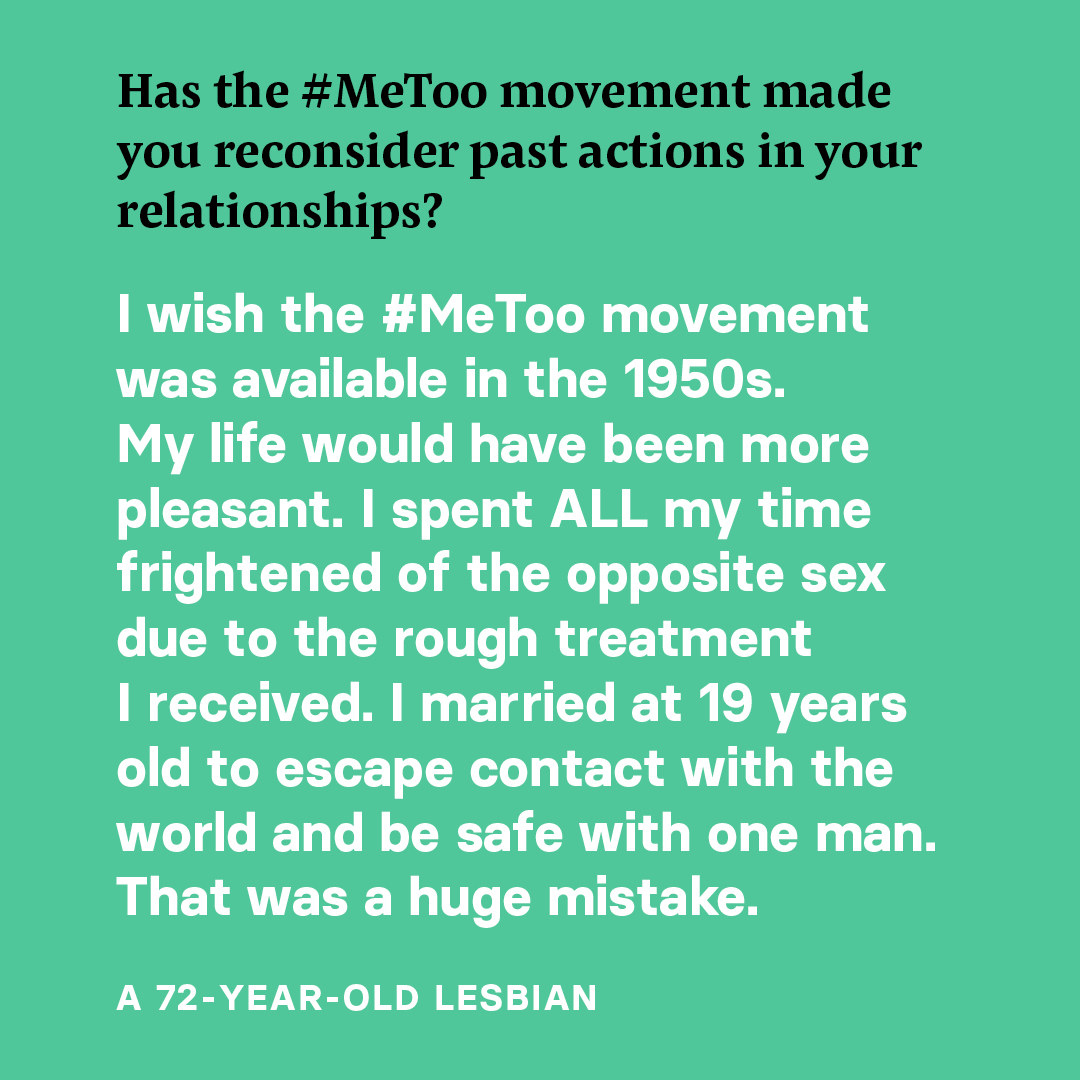
30, bisexual, female
“Yes, I have been more direct with my spouse when I feel like an object of lust (anytime I bend over to pick something up or stretch or try to do yoga, he playfully, in his mind, grabs my hips and humps my ass — so fucking disrespectful and demeaning) and not a recipient of affection. The balance has been trying to tell him why I don’t like it, without him taking it as a direct attack on him showing me he finds me sexually attractive, or that I am no longer romantically interested in him.”
27, gay, male
“It’s made me reconsider the times that I gave in when I really didn’t want to. Which is interesting because that always seems to be something people don’t understand. Like, ‘if I just keep asking/hinting at it, eventually they’ll want to.’ Like, no, the first answer you get is the answer you get. Don’t ask again, I’ll let you know if my decision has changed naturally. And if at that point you aren’t interested anymore, then that’s fine too.”
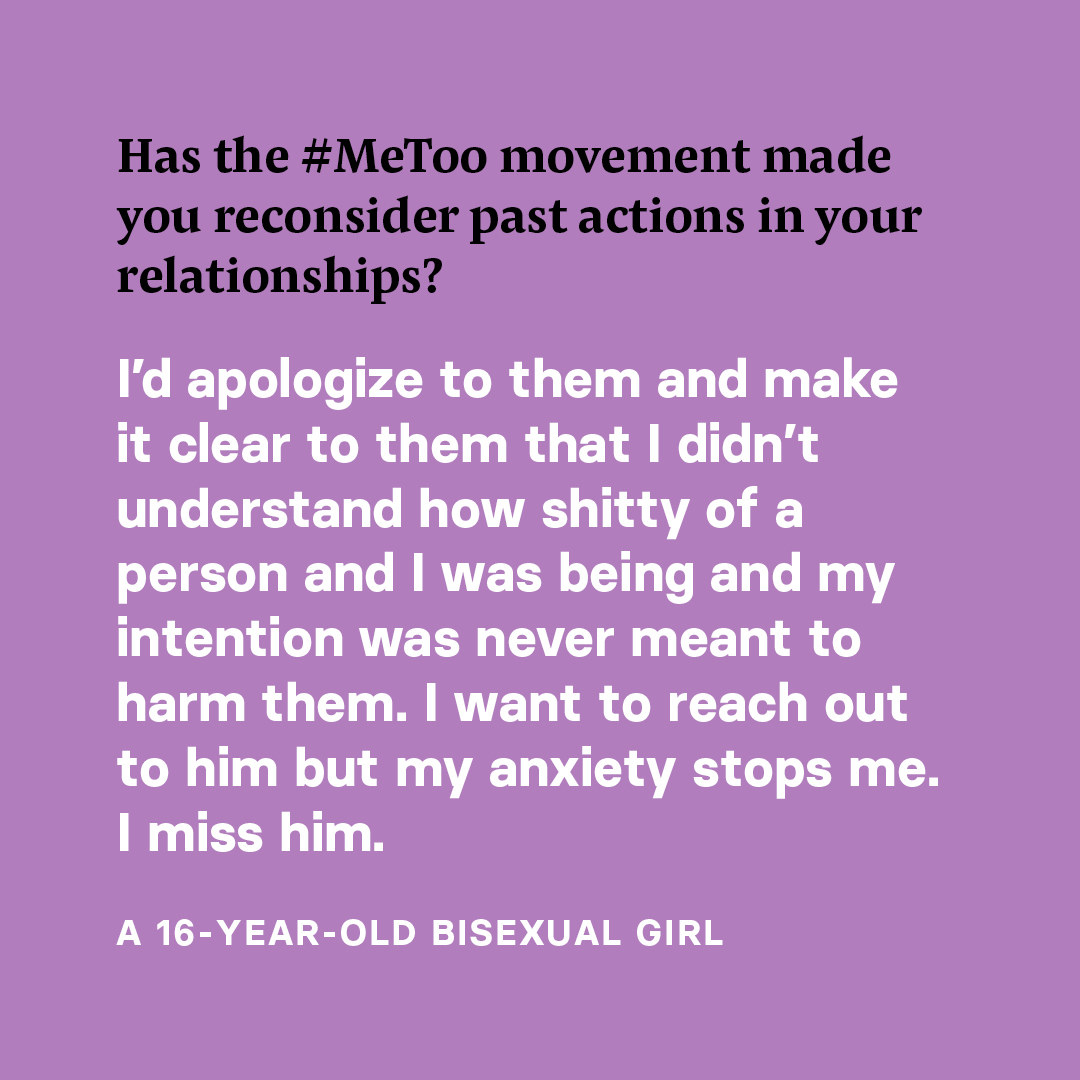
Would you ever reach out to any people you’ve had uncomfortable encounters with and talk about what happened?
31, straight, female
“I've attempted to, with one recent partner, about a very recent incident. It was like speaking to a brick wall. He didn’t listen at all to my concerns and dismissed them entirely to start with, only to move on to blaming me (and all other women) for what had occurred, and then insulting me with the usual slurs, including that I was terrible in bed, that I was frigid, and that I was a slut (how I was both frigid and a slut was confusing; when I inquired as to how that was possible, he exploded into further insults). It ended with me blocking him. It was particularly sad as we had been friends for a few years beforehand, and he was fairly supportive and understanding of feminism up to this point. Basically, he felt I owed him sex because of our acquaintance and because he had paid for my dinner on a previous occasion (against my express wishes for him not to; he had waited until I was in the bathroom to pay).”
22, bisexual, male
“Yes. I have talked to one of those people, she and I discussed it. We spoke about how hard it is as teenagers to even know that something is wrong, because we were never told. Not by our public schools, and certainly not by our evangelical families and churches. A lack of education and awareness leads to people getting hurt and hurting each other without even necessarily knowing it is happening.”
27, straight, male
“Already did, it was an amazing experience because it turns out that both me and the woman I hurt thought we had each taken advantage of the other. It was a huge weight off my chest to know that she forgave me after my apology. We’re actually good friends now and have family dinners occasionally.”
16, bisexual, female
“I’d apologize to them and make it clear to them that I didn’t understand how shitty of a person and I was being and my intention was never meant to harm them. I want to reach out to him but my anxiety stops me. I miss him.”
28, straight, male
“I am too scared and too embarrassed to reach out. I am not even sure if they feel I was inappropriate or if they will even remember my actions the way I do. I don’t want to bring it up if the other person never thought it was wrong. Especially since I haven’t seen that person in almost 10 years. Most of all I am afraid that something I did as a stupid college kid 10 years ago might ruin my life if the other person wanted it to.”
33, pansexual, female
“I'm still social media friends with the man who raped me. He doesn’t realize what he did and would not take me seriously if I tried to tell him what he did. If anything, I’ve cut these men and men who have consent and boundary issues even further out of my life.” ●
This story is part of a series about sex in this complicated cultural moment.

